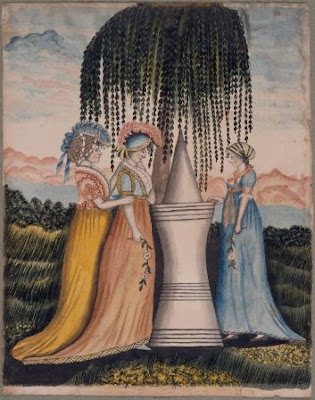Sunday, March 7, 2010
Pinney, the Devil, and the Three Sisters
Monday is International Women's Day, and though I remain a little dubious about the whole idea, it's a useful theme for a blog post or two. I've always been aware that the painters presented at BGN are overwhelmingly male. There's a good reason for that. I try to use only images that are in the public domain, which generally confines me to material before 1920. There are a lot of contemporary women artists whose work I'd love to display, but it's under copyright and I have found that it's a big ol' waste of time to chase down permission to post something. People usually won't even answer a request. As for notable women painters before 1920, there really aren't that many of them, and just like the men, most of what they produced was dull and unimpressive. This makes for a very scanty selection of paintings by women that are worth posting.
That said, there are some beautiful works done by women back in the bad old days, and Three Women Standing by a Funerary Monument by Eunice Pinney (1770-1849) is among them. Pinney was a self-trained artist who seems to have had a powerful fascination with death and cemeteries. One of her paintings depicts her own future grave, surrounded by mourners. I love the vibrant color in her work, and there's something very compelling about her flat figures. Three Women caught my eye because I was looking for an image to illustrate a folk tale, "How the Devil Married Three Sisters." This is essentially a variation on the Bluebeard story, but in this version the women are their own rescuers:
Once upon a time the devil was seized with a desire to marry. He therefore left hell, took the form of a handsome young man, and built a fine large house. When it was completed and furnished in the most fashionable style he introduced himself to a family where there were three pretty daughters, and paid his addresses to the eldest of them. The handsome man pleased the maiden, her parents were glad to see a daughter so well provided for, and it was not long before the wedding was celebrated.
When he had taken his bride home, he presented her with a very tastefully arranged bouquet, led her through all the rooms of the house, and finally to a closed door. "The whole house is at your disposal," said he, "only I must request one thing of you; that is, that you do not on any account open this door."...(more)
Subscribe to:
Post Comments (Atom)



No comments:
Post a Comment